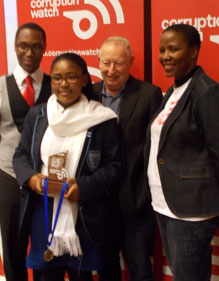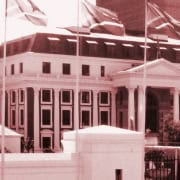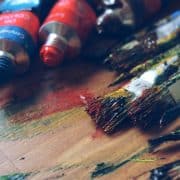|
Getting your Trinity Audio player ready...
|
 By Valencia Talane
By Valencia Talane
“We have to create an environment that is not comfortable for the corrupt. The most important way is to increase the public’s voice against them.”
The quote is from a policy document penned by a team of five high school learners who recently competed in the inaugural Model Youth South Africa challenge, a contest organised by Corruption Watch and Debate Afrika in Bloemfontein in the Free State.
Through the challenge, the two organisations allowed youngsters from 10 schools in the province to showcase their organising, campaigning, creative writing and debating skills for the ultimate prize of a computer that was donated by Corruption Watch to the winning school.
The policy documents were created in the second phase of the challenge, with each team having to argue whether corruption is a moral or legal issue. The young contestants showed impressive insight into the various facets of corruption, recognising the depth and scale of the problem, stating that leaders must be held accountable, and taking wisdom from noted leaders or other authors.
The challenge’s facilitator, University of the Free State law student Zola Valashiya, used social media platforms to share the rules with the teams as well as to encourage professional presentations of their arguments.
The documents also formed part of the basis on which each team would be judged. Well-argued points, written in the correct format, with bibliographies, as well as submission within the given deadline were factors that could push a team into the top position.
Wise words from the young
In the spirit of encouraging other youngsters to engage in anti-corruption activities within their communities, we share snippets of nine of the policy documents below, with links to the full documents for those who wish to read them. We hope our readers will appreciate the efforts of the teams of young corruption busters.
Team 1
“…In a country as diverse and complex as South Africa, with an inclusive decision-making process as we have, it is imperative that not only our government, but also high-ranking individuals’ deeds and misdeeds are publicly broadcast. As a country it is imperative that we stay informed about corruption as we need to make decisions that work toward bettering our country.
The law plays a fundamental role in our society, its main purposes are to protect people from external misuse (robbery etc.); to establish the rules needed for a society to function in harmony (traffic laws etc.) and to advocate and administrate justice thus maintaining social order. As human beings are the ones implementing the laws, they fall subject to human error due to our imperfections.”
Team 2
“…Economic reform… shouldn’t be confused with job creation. This is about creating an environment for development and growth. This will be an incentive in a sense especially to the youth. This will make the industry more dynamic rather than stagnant by bridging the gap between opportunities and the youth. This will be accomplished through easy access to resources and the availability of resources. This will encourage citizens to be more active in democratic country. It will bring about sustainability in the country…”
Team 3
“… the main problem with corruption is that it affects the defenceless people in society, in most cases it violates the rights of people. The objective that out policy envisages to achieve is that people must be given more power to know what happens with resources used by people in higher seats with a lot of power meaning we need more transparency within our government, government employees, etc. …”
Team 4
“…we have to create an environment that is not comfortable for the corrupt. The most important way is to increase the public’s voice against them. South Africa is on a slippery slope of corruption. It should never be tolerated irrespective who you are the law shall take its course upon you. People should wake up from this dream or rather fantasy, saying that corruption is in our bloods. This is just a myth…”
Team 5
“..most prevalent forms of corruption are tenderpreneurism – which is a term that describes individuals who enrich themselves through corrupting the awarding of government tender contracts, mostly based on personal connections and corrupt relationships – and BEE Fronting, which is an abuse of the rules governing Black Economic Empowerment where qualifying persons are given a seat on the board of directors of a company while having no decision making power in the company in order to qualify the company for government contracts…”
Team 6
“…our governing system, officials and government employees ought to be held accountable. Because resources cannot be exploited so drastically and yet the situation goes unnoticed or people are oblivious to this issue taking into consideration the impact and effect this has on society and our well-being. The doors of opportunity still remain closed for some of our fellow brothers and sisters, due to the corrupt governance that resides behind the fancy desks of our country’s statesmen and women…”
Team 7
“People’s voices are being muted by force, fear or bribes. Studies have been done for about or at least 100 years and show that virtually all crimes (corruption) is related or linked to money.”
Team 8
“…governments must include anti-corruption measures in their development strategies if progress is to be made in this field. However, government action will not be enough. Key to fighting corruption is the inclusion of the private sector in the implementation of anti-corruption strategies. If the fight against corruption is to make any progress, the private sector cannot leave all the work to the government. Businesses must actively seek to eliminate corruption within their ranks, by keeping bribery out of the tendering and procurement processes and eliminating extortion…”
Team 9
“Anti-corruption work is not just about punishing the corrupt. A holistic approach goes much deeper than criminalization and prosecution; it should be prevented by building transparent, accountable and reliable systems of governance as well as improving public integrity and strengthening public ethics. One can also go as far as challenging social norms that allow corruption to exist. In order to build such systems, one has to take into consideration the principles and moral codes required in order to sustain advancement. “









